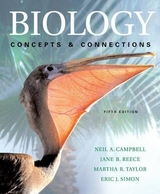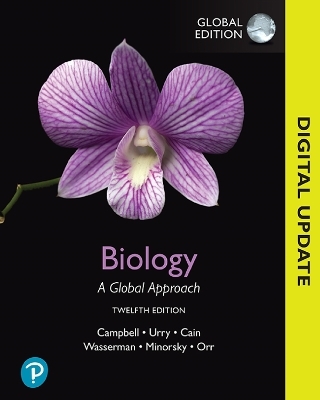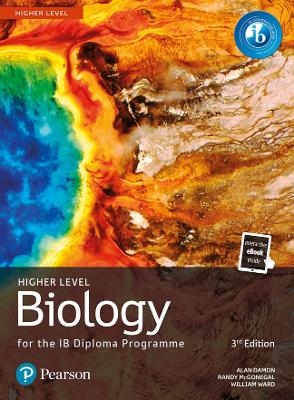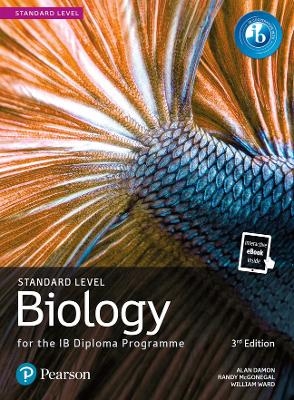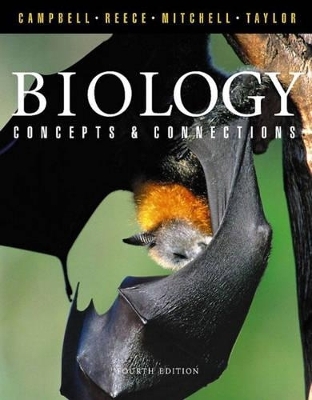
Biology
Pearson
978-0-321-10679-7 (ISBN)
- Titel erscheint in neuer Auflage
- Artikel merken
Created to spark students' sense of wonder about life in its many forms, Biology: Concepts and Connections, Fourth Edition invites students into the world of biology. While encouraging students to explore interactive media activities, the text facilitates mastery of concepts and core biological material through unique modules that combine exceptional art, text that "walks" students through the illustrations, and compelling real-world connections. These modules help students break down the reading into manageable sections and allow flexibility in tailoring the material to make Biology: Concepts and Connections, Fourth Edition the perfect fit for your syllabus.
Neil A. Campbell has taught general biology for 30 years, and with Dr. Reece, has coauthored Biology, Sixth Edition, the most widely used text for biology majors. His enthusiasm for sharing the fun of science with students stems from his own undergraduate experience. He began at Long Beach State College as a history major, but switched to zoology after general education requirements "forced" him to take a science course. Following a B.S. from Long Beach, he earned an M.A. in Zoology from UCLA and a Ph.D. in Plant Biology from the University of California, Riverside.He has published numerous articles on how certain desert plants thrive in salty soil and how sensitive plant (Mimosa) and other legumes move their leaves. His diverse teaching experiences include courses for non-biology majors at Cornell University, Pomona College, and San Bernardino Valley College, where he received the first Outstanding Professor Award in the Department of Botany and Plant Sciences at UC Riverside, which recognized him as the university's Distinguished Alumnus for 2001. In addition to Biology, Sixth Edition, he is coauthor of Essential Biology.Jane B. Reece has worked in biology publishing since 1978, when she joined the editorial staff of Benjamin Cummings. Her education includes an A.B. in Biology from Harvard University, an M.S. in Microbiology from Rutgers University, and a Ph.D. in Bacteriology from the University of California, Berkeley. At UC Berkeley and later as a post-doctoral fellow in genetics at Stanford University, her research focused on genetic recombination in bacteria. Dr. Reece taught biology at Middlesex County College (New Jersey) and Queensborough Community College (New York). During her 12 years as an editor at Benjamin Cummings, she played major roles in a number of successful textbooks. Subsequently, she was a coauthor of The World of the Cell, Third Edition, with W. M. Becker and M. F. Poenie. With Dr. Campbell, she coauthors Biology, Sixth Edition, and Essential Biology.Lawrence G. Mitchell has 21 years of experience teaching a broad range of life science courses at both undergraduate and graduate levels. He holds a B.S. degree in Zoology from Pennsylvania State University and a Ph.D. in Zoology and Microbiology from the University of Montana. Following postdoctoral research with the National Institute of Allergy and Infectious Diseases. Dr. Mitchell joined the biology faculty at Iowa State University in 1971. He received the Outstanding Teacher Award at Iowa State in 1982. In addition to numerous research publications in aquatic parasitology, Dr. Mitchell has coauthored the textbook Zoology, two laboratory manuals, and a study guide for introductory biology. He has also developed television courses in general biology and has written, produced, and narrated programs on wildlife biology for public television. Dr. Mitchell is a full-time writer.Martha R. Taylor has been teaching biology for more than 20 years. She earned her B.A. in Biology from Gettysburg College and her M.S. and Ph.D. in Science Education from Cornell University. She was Assistant Director of the Office of Instructional Support at Cornell for seven years. She has taught introductory biology for both majors and non-majors at Cornell University for many years and is currently a visiting lecturer in Cornell's introductory biology laboratory course. Based on her experiences working with students from high school and community college through university, in both classrooms and tutorials, Dr. Taylor is committed to helping students create their own knowledge of and appreciation for biology. She has been the author of the Student Study Guide for all six editions of Biology by Drs. Campbell and Reece.
1. Introduction: The Scientific Study of Life. I. THE LIFE OF THE CELL. 2. The Chemical Basis of Life. 3. The Molecules of Cells. 4. A Tour of the Cell. 5. The Working Cell. 6. How Cells Harvest Chemical Energy. 7. Photosynthesis: Using Light to Make Food. II. CELLULAR REPRODUCTION AND GENETICS. 8. The Cellular Basis of Reproduction and Inheritance. 9. Patterns of Inheritance. 10. Molecular Biology of the Gene. 11. The Control of Gene Expression. 12. DNA Technology and the Human Genome. III. CONCEPTS OF EVOLUTION. 13. How Populations Evolve. 14. The Origin of Species. 15. Tracing Evolutionary History. IV. THE EVOLUTION OF BIOLOGICAL DIVERSITY. 16. The Origin and Evolution of Microbial Life: Prokaryotes and Protists. 17. Plants, Fungi, and the Colonization of Land. 18. The Evolution of Animal Diversity. 19. Human Evolution. V. ANIMALS: FORM AND FUNCTION. 20. Unifying Concepts of Animal Structure and Function. 21. Nutrition and Digestion. 22. Respiration: The Exchange of Gases. 23. Circulation. 24. The Immune System. 25. Control of the Internal Environment. 26. Chemical Regulation. 27. Reproduction and Embryonic Development. 28. Nervous Systems. 29. The Senses. 30. How Animals Move. VI. PLANTS: FORM AND FUNCTION. 31. Plant Structure, Reproduction, and Development. 32. Plant Nutrition and Transport. 33. Control Systems in Plants. VII. ECOLOGY. 34. The Biosphere: An Introduction to Earth's Diverse Environments. 35. Population Dynamics. 36. Communities and Ecosystems. 37. Behavioral Adaptations to the Environment. 38. Conservation Biology.
| Erscheint lt. Verlag | 14.8.2002 |
|---|---|
| Sprache | englisch |
| Maße | 230 x 275 mm |
| Gewicht | 1902 g |
| Themenwelt | Naturwissenschaften ► Biologie |
| ISBN-10 | 0-321-10679-2 / 0321106792 |
| ISBN-13 | 978-0-321-10679-7 / 9780321106797 |
| Zustand | Neuware |
| Haben Sie eine Frage zum Produkt? |
aus dem Bereich
